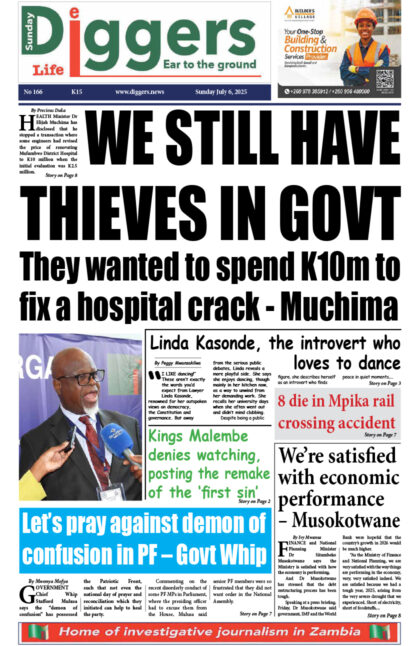Football House disputes may be on the way to resolution now that Sports Minister Emmanuel Mulenga has proposed an emergency meeting where the Football Association of Zambia, stakeholders and the aggrieved parties can air their grievances.
According to the minister, all parties have agreed to hold an emergency meeting which will be final, to avoid being penalised by FIFA. But how did Zambia end up is this position in the first place?
A few months into Mulenga’s tenure as Sports Minister, FAZ announced the appointment of Vaselin Julisic, a Serbian national as Chipolopolo coach. The Ministry of Sports vetoed the appointment, with Mulenga pointing out that FAZ did not follow the laid down procedures, which included advertising for the vacant position.
That did not sit well with the association who then wrote FIFA, reporting that the Minister had interfered in the running of its affairs. This, however, is only the tip of an iceberg in as far as the conflicts at Football House are concerned. Zambia has been revered as one of Africa’s finest footballing nations over the years but the country is now not a stranger to controversy surrounding the administration of soccer.
Goal Diggers looks at the major developments over the years that have put FAZ in its current position.
Kamanga wins elections, stamps his authority

On March 19th 2016, Andrew Kamanga, a renowned Lusaka businessman, was elected president of the association ahead of former Chipolopolo star and legend Kalusha Bwalya.
Prior to the election, the acclaimed businessman had vowed to be a disciplinarian. His first step towards that goal came shortly after he revised the FAZ constitution, a move he said was aimed at addressing contentious issues in the previous document.
Soon after that huge accomplishment, Kamanga, like he pledged before being elected into office, disciplined people who were seen to have been close to him and participated in getting him to the presidency.
Soccer administrator Blackwell Siwale, Simataa Simataa and Richard Kazala, the latter who was elected vice president in the same election, were banned from all soccer-related activities after being accused of leaking confidential FAZ documents to the public. Kazala was also accused of mismanagement of FAZ funds.
Over Kamanga’s four year tenure in office, Maureen Kawengele, Shaibu Kasai, Nkweto Tembwe, Mumbo Lombe, Bonaventure Mutale and Damiano Mutale were also banned for various transgressions.
This catalysed conflicts, with the banned individuals claiming that illegalities were being committed by Kamanga in the running of the association.
New Constitution stirs controversy
According to numerous soccer administrators, Simataa Simataa among them, the Kamanga revised constitution has more lacunas than it’s predecessor.
The major cause of conflict as regards the FAZ constitution is the Ethics Committee.
The 2017 revised constitution introduced an integrity test which would be conducted by the Ethics (integrity) committee on anyone vying for a FAZ related position. The Electoral Committee, whose mandate was to organise and supervise elections, was also introduced together with the Elections Appeals Committee. According to the constitution, the individual heading the Ethics Committee should have a degree in law, should be a member of LAZ and should not be conflicted.
Katongo’s appointment and other breaches of the constitution

When FAZ appointed Kephas Katongo to head the Ethics Committee in 2017, those within football circles noted that although a lawyer, he was not a member of LAZ and therefore did not qualify for the role.
Katongo later joined LAZ, albeit two years after his appointment. This attempt to paper over the cracks proved futile, with some stakeholders insisting that all integrity tests done under his watch are null and void.
Legal action has been taken by a number of soccer administrators regarding the matter.
According to the FAZ constitution, the Electoral Committee is supposed to act in accordance with the electoral code of ethics. However, this code of conduct was never written.
To worsen the situation, the Committee itself, which was supposed to be constituted in 2017, was never constituted until 1st February 2020, three years after the constitution was amended.
The Ethics Committee was the only committee instituted in 2017, and therefore played several roles.
This has led stakeholders to claim that any election conducted between March 2017 and 1st February 2020 is illegal.
Constitutionally, in 2019, FAZ was scheduled to make eight amendments to the constitution. It was a constitutional requirement that a representative from every region around Zambia be present during the amendments. FAZ, thus, went around the country just before the end of the year conducting workshops where delegates were chosen to represent various regions during the Emergency General Meeting (EGM) in February 2020. The EGM’s main agenda was to create a road-map for the elections which were supposed to be conducted on 28th March, 2020.
The selection of these delegates and the creation of the electoral road-map is a mandate of the Electoral Committee. But because the Electoral Committee had not yet been constituted, FAZ made the undertaking on its own, breaching the constitution yet again.
FAZ went ahead to amended the constitution and the same delegates appointed in 2019 voted and approved the Electoral Committee, instituted the Electoral Code of Conduct and voted for and approved the Electoral Appeals Committee.
FAZ then wrote a letter to FIFA, informing them that a road-map for the elections had been approved.
These maneuvers would prove counterproductive for the FA after some stakeholders filed lawsuits against the administration.
FAZ writes FIFA over govt ‘interference’
A month before the EGM, Mulenga wrote to FAZ instructing them to ensure that the electoral process was free and fair. This irked the association who then wrote to FIFA, complaining of a possible interference into the running of its affairs by the government.
Several correspondences have since been made between FAZ and FIFA, with FIFA warning that Zambia risks being sanctioned should there be traces of a possible interference.

The Sports Minister was forced to stop commenting and issuing directives on issues related to the running of FAZ. However, the disputes intensified during the run up to the 2020 elections when former FAZ Chief Kalusha Bwalya came back into the picture.
Kalusha Bwalya goes head to head with Kamanga
In 2019, Kalusha Bwalya’s term of office as a CAF executive member came to an end. In order to re-contest his position, he needed FAZ to endorse him.
Meanwhile Kamanga also expressed interest to contest the position shortly after Bwalya made known his intentions.
Although Bwalya enjoys popularity locally and across the continent, the association sidelined him after he failed an integrity test.
In the past, Bwalya had been found guilty of corruption (Committed when he was FAZ president) by FIFA and saved a ban. Although at the time of the integrity test, both FIFA and CAF had reinstated Bwalya back to his previous positions, FAZ endorsed Kamanga who lost the election, accumulating the least votes among the candidates who contested, much to the disgust of Zambian soccer fanatics and administrators.
Although there was no love lost between Kamanga and Bwalya, their battle for endorsement only deteriorated their relationship.

With the 2020 elections coming up, Bwalya came seeking for a second stint at the helm of FAZ, a move that escalated the conflicts at Football House. His nomination, along with those of three others to contest the elections, was successful, but an integrity test yet again penalised him.
The integrity test consists of three simple questions: have you been banned before; have you been found guilty of corruption and fined before and are you being investigated currently?
The Integrity Committee chaired by Katongo, ruled that the former Chipolopolo star could not pass the test because he was once found guilty of corruption, fined, banned and was being investigated by the Anti-Corruption Commission.
In response to this, Bwalya filed an appeal at the Court of Arbitration for Sports.
Meanwhile, those in support of Kalusha Bwalya and others have noted that Kamanga himself is being investigated by the Zambia Police over a computer server that went missing at Football House and therefore his integrity is also in question.
Court halts elections
Since the beginning of the year FAZ has been targeted with lawsuit after lawsuit, mostly because of breaches of its constitution under Kamanga’s administration.
Some stakeholders have even accused Kamanga of using the Ethics Committee to block would-be opponents in the coming election.
The FAZ elections were ultimately brought to a halt when Damiano Mutale and Patson Lusaka successful filed that the elections be halted. The court directed that the electoral process be halted until all legal matters pertaining to the elections are heard and determined.
FAZ has also been in limbo on who should lead the association during this period since Kamanga’s term officially came to an end on 19th March, 2020.
FIFA has guided that Kamanga and his executive continue running the association until elections are held. But Mutale and Lusaka, represented by Lewis Mosho’s law firm Lewis Nathan Advocates, have contended that the move is illegal. They have said the constitution stated that a term shall be four years, implying that one cannot continue after four years.
A letter has since been written to the National Sports Council of Zambia and the Ministry of Sports while Mutale and Lusaka have vowed to take legal action should Kamanga continue running the association.
FIFA has observed and realised the need to help Zambia resolve these disputes and have pledged to send a representative once the Covid-19 situation normalises.




















5 responses
After reading this, it looks like the writer is only bringing out ills on Kamanga. Why not point out the sports ministers mistakes and the indiscipline of Kalusha as well.
I agree with the comments from the Anonymous – I would like hear from FAZ itself .In any case Fifa has already advised.
Very prejuidicial writeup without full understanding at what is happening.
This is not about kamanga or kalusha. it about zambia. 1 both of these guys have made mistakes and i bet they have lent one or two things. let no one block the other. let them both stand for elections and the best will win and zambia will come from behind and be the footballing nation we used to know. remember no one is perfect
Even the MInister is suspect due to how he had conducted himself. Besides I thought the agreement was that FIFA officials should be present when having this meeting?